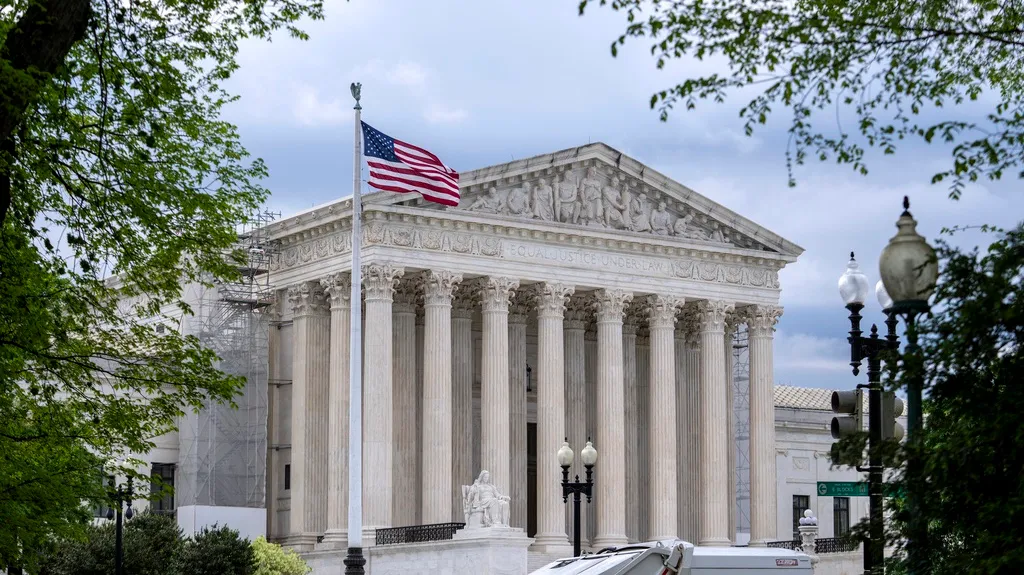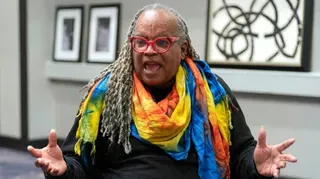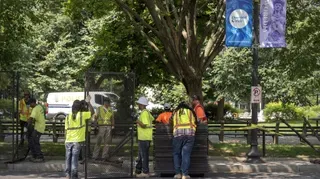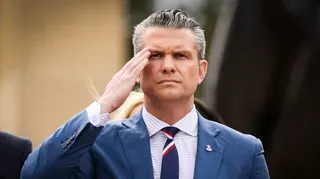March 12, 2012
Advocates Attend White House Conference on Homeless LGBT Youth
Winnie McCroy READ TIME: 5 MIN.
Prominent leaders in the fight against homelessness among LGBT youth gathered in Detroit on Friday to attend a White House conference on the subject.
Hosted in partnership with the U.S. Department of Housing and Urban Development and the Detroit-based Ruth Ellis Center; the conference featured a panel that included Ruth Ellis Center executive director Laura Hughes, Ali Forney Center executive director Carl Siciliano and Theresa Nolan, director of LGBT youth programs at Green Chimneys in New York City.
"Having this event here was historic in many ways," said Hughes, whose organization is the Midwest's only center that specifically serves LGBT youth. "It was powerful to have [HUD Secretary Shaun] Donovan talk about homelessness among LGBT youth. And to be on a panel with Carl and Theresa was incredible; they are doing such great work."
Hughes added she was heartened that this event took place in Michigan-a state that has yet to add sexual orientation or gender identity and expression to its anti-discrimination law, second-parent adoptions or marriage to same-sex couples.
"There is a laundry list of things we don't have, so to have the Ruth Ellis Center here and to find at this conference how that pairs with the federal focus on LGBT rights was really good," said Hughes, who added that the conference sent a strong message that this activism is not exclusive to New York City, San Francisco and other East and West Coast cities
Nolan, a Michigan native herself, agreed.
"Typically, only the East or West Coast cities highlight these issues, but in fact, there is great stuff happening in other places-that we were having a federal conversation here about LGBT housing issues can only shed an important spotlight on the fact that disenfranchised people, especially LGBT youth, are experiencing layers of trauma on top of each other," she said. "We as a society don't want to keep disenfranchising them; it is our responsibility not to have roadblocks."
In his remarks on which EDGE previously reported, Donovan noted that roughly seven percent of American youth identify as LGBT. Of those who are homeless, more than 40 percent are LGBT.
"LGBT youth experience more acts of sexual violence, are more at risk for conditions like post-traumatic stress disorder, and are more likely to become depressed than their heterosexual counterparts," said Donovan. "Perhaps most troubling of all, the majority of young people surveyed report harassment, difficulty, or even sexual assault when trying to access homeless shelters-the very places where they should start to feel safe. Allowing this to happen is not only wrong-it's also not who we are as Americans. All of us-regardless of our sexual orientation, race, gender, or gender identity-deserve a place to call home."
Siciliano was grateful that HUD and the Obama administration have recognized homelessness among LGBT youth as a problem. During his early work with the Safe Space NYC drop-in program in 2001, Siciliano noted that the Bush administration cut funding once it discovered the initiative served LGBT youth.
"One day they heard LGBT, and it was like I had pulled out a crucifix in front of vampires," he said. Siciliano added that the Bush administration either denied or revoked the contracts of the Ruth Ellis Center and other groups that had applied for federal grants to serve LGBT people.
While getting federal recognition was an important first step, Siciliano stressed the next hurdle is finding a way to fund beds for the thousands of gay youth stranded every night on park benches.
Siciliano: National LGBT Organizations Need to Show Strong Leadership
Siciliano said the problem rests not only with the federal government, but with the larger LGBT community. While advocacy groups have prioritize marriage equality and the repeal of 'don't ask, don't tell,' Siciliano stressed they have not focused enough on the problem of homeless LGBT youth.
"The phenomenon where well over 100,000 young people are cast out of their homes and denied economic support because they are gay is the most terrible example of homophobia in our time," said Siciliano. "It is really problematic, and I don't think there will be an adequate government response until it becomes a priority within the LGBT movement."
Siciliano threw down the gauntlet to the LGBT movement; urging the Human Rights Campaign, the Empire State Pride Agenda and other groups to acknowledge that homelessness among LGBT teenagers is a major problem. He urged these groups to begin to dedicate a percentage of their budgets towards addressing it.
This message struck home for Hughes.
"The reality is our young people are part of our family, and when they are kicked out, neglected, and abused, it is our responsibility to take care of these children," she said. "They got our message that they should come out and be proud, but it's also our responsibility to make sure that there's a safety net for kids who got that message. The gay community has to drive a strong power base of other organizations and corporations to deal with this."
Nolan also saw these issues as interconnected.
"It's really a civil rights issue. A lot of time people pay attention to marriage or DADT or LGBT homelessness, but in reality they're all intertwined," she said. "If an LGBT kid grows up without the possibility of being married, that sends the message that they aren't valued" just as clearly as does a lack of housing and services.
In an afternoon workshop that focused on the social and emotional well-being of LGBT youth, Nolan and other activists who attended the conference discussed the importance of local activism and community organizing. Even for larger New York City groups, she said resources are not just given-community organizing is required to get policies in place, and outreach is required to obtain services. Nolan said that even one provider or activist can make an impact on a young person by being LGBT-affirming or making small changes that have the ability to change a teen's life.
Hughes said that while there was still a lot of work to be done; being around Siciliano and Nolan inspired her and other activists working in Detroit; Columbus, Ohio, and other Midwest cities that the young people with whom they work could stay in their hometown and not have to sever their support networks just to remain safe.
The conference went far in spreading the word that HUD was focusing on providing equal access to housing under the direction of the highest levels of government. Nolan was pleased that it was part of a series of gatherings that will focus on bullying and other LGBT-specific topics.
"It is a clear message that at the White House level, LGBT issues are certainly something we want to be concerned and talking about now," she said.
"The fundamental issue here is equality... not marriage or serving in military, but not having equal access to your parent's home, love, and support," added Siciliano. "It is harder to deal with because it's not a matter of changing the law. There needs to be a massive public education aimed at helping parents cope with and accept their gay kids, and a commitment to providing beds so these kids aren't dying in the streets. That's got to be what the gay community is calling for."
To that end, the Ali Forney Center is currently looking at sites for their new 24-hour drop-in center that Siciliano hopes will open within the next year.
Log onto www.aliforneycenter.org, www.greenchimneys.org or www.ruthelliscenter.org for more information.
Winnie McCroy is the Women on the EDGE Editor, HIV/Health Editor, and Assistant Entertainment Editor for EDGE Media Network, handling all women's news, HIV health stories and theater reviews throughout the U.S. She has contributed to other publications, including The Village Voice, Gay City News, Chelsea Now and The Advocate, and lives in Brooklyn, New York.






